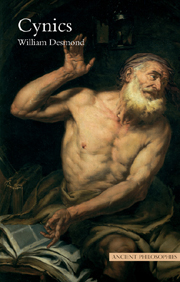Book contents
- Frontmatter
- Contents
- Acknowledgements
- Introduction
- 1 Ancient Cynics and their times
- 2 Renunciation of custom
- 3 A life according to nature
- 4 Chance, fate, fortune and the self
- 5 Anarchists, democrats, cosmopolitans, kings
- 6 Cynic legacies
- Glossary of names
- Glossary of Greek terms
- Notes
- Guide to further reading
- Bibliography
- Index
Introduction
- Frontmatter
- Contents
- Acknowledgements
- Introduction
- 1 Ancient Cynics and their times
- 2 Renunciation of custom
- 3 A life according to nature
- 4 Chance, fate, fortune and the self
- 5 Anarchists, democrats, cosmopolitans, kings
- 6 Cynic legacies
- Glossary of names
- Glossary of Greek terms
- Notes
- Guide to further reading
- Bibliography
- Index
Summary
According to legend, Alexander the Great had heard reports of a particular philosopher who professed a strange sort of wisdom. Owning little more than the clothes he wore, this man lived in the open in cities such as Athens and Corinth. At night he might sleep on the ground, or in porticoes or the entrances of temples, while during the day he wandered about, passing remarks about the people he met and the foolish things he saw them doing. This philosopher was said to have been exiled from his native city of Sinope, far to the north on the Black Sea, but he did not care, he said. His home was the whole earth, and he could live anywhere he liked. He was happier than kings, he said, and freer, more courageous, more just and better in all ways. In fact, everyone should become an exile like him, he said, and give up property, jobs, citizenship: everything. All these simply tie people down and make them unhappy, as they work and save for things that they do not need. If they lived like the birds or animals, they would have everything they want and be like gods. Such things the philosopher used to say to everyone he met, sometimes with a joke or a wry word, sometimes shouting, or rolling on the ground to make his point. In any case, he was quite a show and although his name was Diogenes, he was generally called by his nickname, “the Dog”.
- Type
- Chapter
- Information
- Cynics , pp. 1 - 8Publisher: Acumen PublishingPrint publication year: 2008



